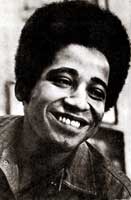
Prisoner activist George Jackson was assassinated at San Quentin on this day in 1971, giving birth to the modern prisoner rights movement. In time his death would lend itself to what became known as "Black August". I'm including this in APW's pages because it's central to the modern prisoner rights movement, and even today Black August events are held around the country to raise money for political prisoners.
Black August 2009: A story of African freedom fighters
by Kiilu Nyasha
SFBayView 08/03/2009
"Black August is a month of great significance for Africans throughout the Diaspora, but particularly here in the U.S. where it originated. “August,” as Mumia Abu-Jamal noted, “is a month of meaning, of repression and radical resistance, of injustice and divine justice; of repression and righteous rebellion; of individual and collective efforts to free the slaves and break the chains that bind us.”
On this 30th anniversary of Black August, first organized to honor our fallen freedom fighters, Jonathan and George Jackson, Khatari Gaulden, James McClain, William Christmas and the sole survivor of the Aug. 7, 1970, Courthouse Slave Rebellion, Ruchell Cinque Magee, it is still a time to embrace the principles of unity, self-sacrifice, political education, physical fitness and/or training in martial arts, resistance and spiritual renewal.
The concept, Black August, grew out of the need to expose to the light of day the glorious and heroic deeds of those Afrikan women and men who recognized and struggled against the injustices heaped upon people of color on a daily basis in America.
One cannot tell the story of Black August without first providing the reader with a brief glimpse of the “Black Movement” behind California prison walls in the ‘60s, led by George Jackson and W.L. Nolen, among others...." here is the rest of the article...
-----------------------------
Also worth checking out today, given its historical significance, is the radio show "The Struggle Inside", released by Freedom Archives. Exploring the birth of the modern prisoner rights movement with the emergence and assassination of prisoner activists like George Jackson, the documentary features many interviews with political prisoners and liberation movement activists. It about a 30-minute piece, I believe an excerpt from "Prisons on Fire".
It closes with Jonathan and George Jackson's mom recounting a conversation she had with a San Quentin guard soon after George was killed, and he observed that she didn't have any sons left because the state had killed them all.
Her response was "I have sons throughout the world, wherever people are fighting for freedom."









No comments:
Post a Comment